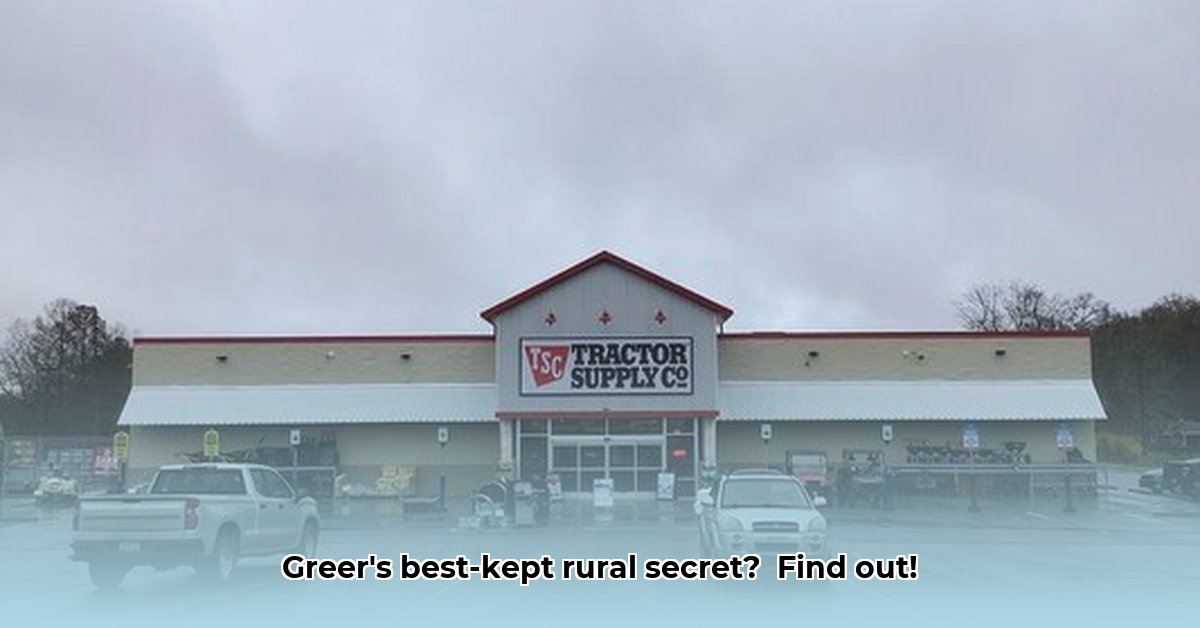
Tractor Supply Company's Greer, South Carolina location serves as a compelling case study in rural retail success. This analysis explores the store's strengths, challenges, and opportunities for future growth, illustrating its significant role within the community. Understanding this localized model offers valuable insights into how rural retail businesses can thrive. For another example of rural retail success, see the Ahoskie, NC store.
Serving the Diverse Needs of Greer's Community
Tractor Supply in Greer differentiates itself through a diversified product offering. Beyond traditional farm equipment and supplies, the store caters to a broad customer base including gardeners, pet owners, and homeowners with acreage. This strategic approach maximizes market reach within the Greer community. Its convenient location within the Piedmont Marketplace ensures accessibility, minimizing the travel burden for customers. Furthermore, the store's success is amplified by consistently positive feedback praising the helpfulness and expertise of its staff, fostering customer loyalty and positive word-of-mouth referrals. This personalized service acts as a powerful, organic marketing tool.
Challenges and Opportunities: Navigating the Rural Retail Landscape
While Tractor Supply in Greer exhibits significant success, several challenges need addressing for sustained growth. A primary limitation is the lack of readily available, detailed performance data. Comprehensive sales figures, customer demographics, and feedback analysis would provide a much clearer picture of strengths and weaknesses, informing more effective long-term strategic planning.
Another critical area is competitive analysis. Identifying direct and indirect competitors, analyzing their strategies, and pinpointing opportunities for market differentiation is essential. This might involve exploring niche product lines or services to add unique value to the customer experience.
Scalability also presents a challenge. Replicating the Greer store's success in other locations requires a careful examination of its operational model. Key success factors—efficient inventory management, strong customer service driven by knowledgeable staff, and a diversified product selection—must be identified and replicated in future expansions.
Finally, integrating sustainable practices into the store's operations is increasingly important. This could encompass sourcing eco-friendly products, implementing energy-efficient measures, and minimizing the environmental impact of supply chain operations.
Actionable Steps for Continued Success
To maintain its leading position, Tractor Supply in Greer should prioritize the following:
Invest in Data Analytics: Implement a robust data collection system to monitor sales data, customer demographics, and feedback. This data will provide actionable insights into consumer preferences and inform efficient resource allocation.
Conduct Thorough Competitive Analysis: A detailed assessment of the local competitive landscape is crucial. This analysis will inform strategic positioning, identifying opportunities for differentiation and competitive advantage.
Explore E-commerce Integration: Expanding online operations can significantly broaden customer reach. Offering online ordering with local delivery or in-store pickup options caters to a larger market segment.
Optimize Supply Chain Efficiency: Streamlining processes, including inventory management and logistics, can improve cost-effectiveness and ensure timely product delivery.
Prioritize Employee Development: Continuous employee training remains critical for maintaining exceptional customer service and building product expertise among the staff.
Synergies with the Greer Community
Tractor Supply's success is intricately linked to its engagement with the Greer community. It serves as a vital resource for local farmers, gardeners, and pet owners. Strengthening these relationships through community initiatives, such as sponsoring local events, collaborating with agricultural organizations, or supporting local farmers' markets, can further enhance brand loyalty and community goodwill. The store's economic contribution—through job creation and supporting local economic growth—extends its positive impact well beyond its immediate customer base.
Risk Assessment and Mitigation
Several potential threats to Tractor Supply's continued success require proactive mitigation strategies:
| Risk Category | Likelihood | Impact | Mitigation Strategy |
|---|---|---|---|
| Economic Downturn | Medium | High | Diversify product offerings, prioritize cost-efficient operations, build strong customer loyalty. |
| Competitor Activity | Medium | Medium | Continuous market monitoring, implement proactive competitive strategies, focus on unique selling propositions. |
| Supply Chain Disruptions | Medium | High | Diversify sourcing, establish strong supplier relationships, explore alternative transportation. |
| Staff Turnover | Low | Medium | Offer competitive compensation & benefits, invest in training and career development, foster a positive work environment. |
Conclusion: A Blueprint for Rural Retail Success
Tractor Supply in Greer showcases a successful rural retail model, built on a foundation of diversified product offerings, strong community ties, and a commitment to exceptional customer service. By proactively addressing identified challenges and capitalizing on opportunities for growth and innovation, Tractor Supply is well-positioned for continued success. This case study provides a valuable framework for other rural retailers seeking to thrive in their local markets. Continuous market research, data-driven decision-making, and a strong focus on community engagement will be key to maintaining this momentum.